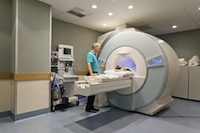
Magnetic resonance imaging (MRI) is a radiological technique used to evaluate the health of a patient’s internal organs, blood vessels, and other tissues. During an MRI scan, the body is subjected to magnetic fields and radio waves that help produce images of the anatomy. In order to form more accurate images, technicians will often administer a contrast agent, which by chemical processes improves the visibility and detail of internal structures. Gadolinium-based contrast agents are most commonly used in brain and blood vessel imaging.
The FDA, along with its National Center for Toxological Research, plans to look into the possible risk of gadolinium in the brain. In its communication, the FDA states it is not known whether these gadolinium brain deposits are harmful. As a free solution, gadolinium is toxic; but in contrast agents it is chelated, or chemically bound to attempt to reduce the toxic effects. Little research has been done on the long-term toxicity of gadolinium tissue deposits in people with healthy kidneys; it has been demonstrated, however, that people with impaired kidney function who have received gadolinium-based contrast agents have developed nephrogenic systemic fibrosis, a severe and progressive disease that can result in fibrosis of both internal and external organs.
At this time the FDA is not requiring manufacturers of gadolinium-based contrast agents to make changes to the labels of their products. The agency does, however, urge patients and practitioners to report any possible side effects related to gadolinium-based contrast agents to the FDA MedWatch program.
